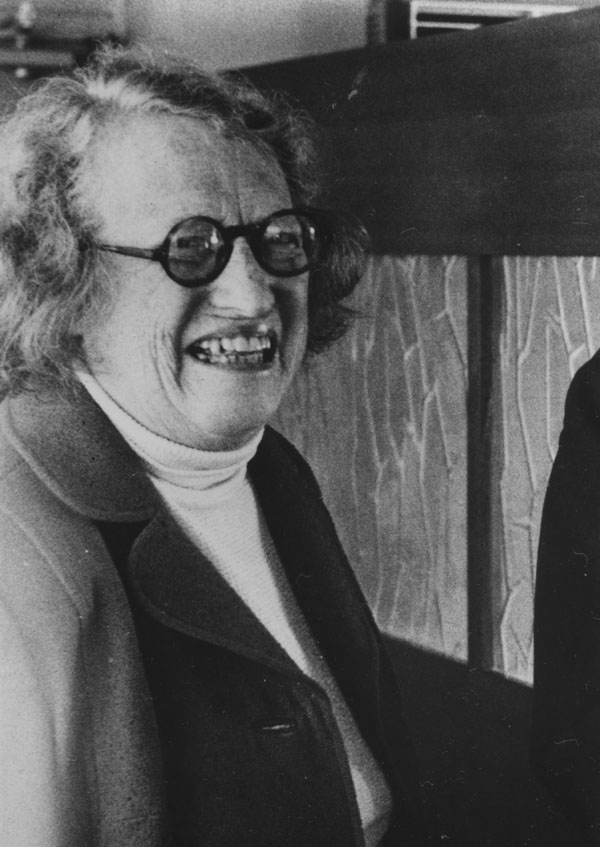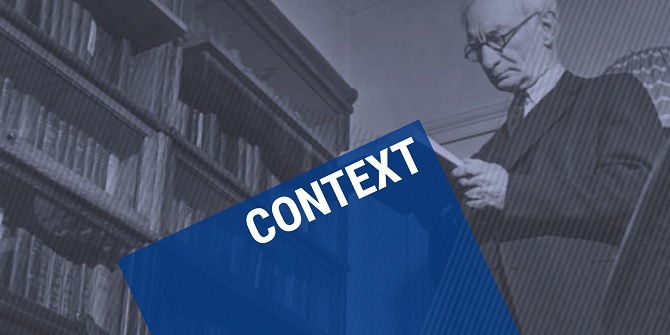Ursula Kathleen Hicks was the first woman editor of a major journal, The Review of Economic Studies, writes Jim Thomas. She was one of the first editors of the journal in 1933 and remained involved until 1979.
While browsing the web when researching the Quarterly Journal of Economics (QJE), I found an item in which the editors of the QJE announced, that from 1 January 2020, a woman economist would be the first woman on the Editorial Board of the QJE.
Given the QJE began publication in 1886, it had taken them a very long time to get there. I began to think about the other top economic journals[1] and remembered vaguely that there had been a woman on the Editorial Board at The Review of Economic Studies (RES) early on and decided to check it. My memory was correct, and the details are presented below.
The founding of The Review of Economic Studies [2]
On the afternoon of Tuesday, 17 January 1933 there was a meeting at the London School of Economics of a group of young economists, many of them graduate students. They were concerned about the difficulties of getting their research published in the existing economic journals and decided to set up a new journal that would operate independently of any university department or learned society. To ensure that the young would remain in control, there was a statement in the first issue of the journal that the objective of the Review was “to supplement the facilities for the publication of new work on theoretical and applied economics, particularly by young writers.” There was also the condition that “Any member of the editorial board who becomes a Reader or Professor in a British University must resign his membership.”
The economists appointed to edit the new journal were Abba Lerner, Paul Sweezy, who was based in the USA, and Ursula K Webb. Ursula K Webb was in her first year as a postgraduate student at LSE when she became an Editor of the RES. She became Ursula Hicks when she married J R Hicks in 1935. From 1933 to 1941, she, Lerner and Sweezy continued as the editors of the journal, where she was listed as “Ursula K Webb (Mrs J R Hicks)”. In 1937 Abba Lerner moved to the USA, leaving Ursula Hicks as the sole editor in London, responsible for running the journal. In 1941, the editorial structure was changed, and she was listed as “Ursula K Hicks (Secretary)”. In 1944 there was another change, and she became Managing Editor, a position she held until 1961, when she and Nicholas Kaldor were listed as Editorial Advisors, and continued in this role until October 1979.
The role of “Editorial Advisor” was purely honorary, but from 1933 to 1961, Ursula Hicks was directly involved in the editorial process. Her contribution was recognised by the Editors of the RES. First, on the 50th Anniversary of the RES in 1983 (p583), the editors, Oliver Hart and Grayham Mizon, wrote:
Nicky Kaldor was another early recruit to the Editorial Board, and shortly after Lerner’s move to the U.S.A. at the end of 1937, he became Chairman. From this time Nicky Kaldor and Ursula Hicks skilfully guided the Review through to the early 1960s. when the foundations for the present editorial structure were laid.
Secondly, in an Editorial in 1986 (p171) Graham Mizon and Kevin Roberts wrote:
Readers may recall that the 50th Anniversary Editorial in the October 1983 issue drew attention to the important roles played by Ursula Hicks and Lionel Robbins in the foundation of the Review. Despite the fact that the original constitution of the Review banned Professors (and hence Lionel Robbins) from membership of the Editorial Board, he provided inspiration for many of the young economists at LSE and underwrote the publication of early issues of the Review. Ursula Hicks, on the other hand, was a founding member of the Editorial Board, and had an active editorial role with the Review over four decades. It is therefore with deep sorrow that we note their recent deaths.
Ursula Kathleen Hicks (1896-1985)
Ursula Kathleen Webb was born on 17 September 1896 in Dublin and was the only child of Quaker parents. She was educated at Roedean School and Somerville College, Oxford, where she graduated with a BA in Modern History (2nd Class) in 1918.

After graduating she spent some years caring for her parents and during this period, she did volunteer work for the Workers’ Educational Association from 1920 to 1928. This kindled her interest in economics and after her father’s death she went to LSE to study economics.
When she started at LSE in 1929 she was aged 33, a mature student. She studied for the BSc (Econ) degree, with the Special Subject of Economics and graduated in 1932 with First Class Honours. She was awarded a Special Leverhulme Research Scholarship and began her studies for a PhD, with Lionel Robbins as her supervisor. She attended Robbins’s Seminar for graduate students and staff, along with among others: Abba Lerner, Nicholas Kaldor, Paul Sweezy, who were also involved in setting up the RES. There were very few women graduate students at LSE at that time. In addition to Ursula Hicks, there was Marian Bowley, who was a graduate student during 1931-36, but had temporary teaching posts away from LSE during two of those years and only attended the Seminar intermittently between 1934 and 1936, when she left LSE. Ursula Hicks “was the ‘mother’ of the economics research students, a friend of all of them, and in that role served the tea at the end of every seminar.” (Howson, 2011, p254). John Hicks, who was a junior member of staff, also attended the seminar, where he was a quiet presence until the seminar ground to a halt over some technical issue. At that point, Robbins would appeal to him and he would often provide a solution to the problem.
Ursula Hicks remained at LSE working on her thesis until 1935, when she was appointed as an Assistant Lecturer and began teaching. Then she married John Hicks[3] and, when he was appointed to a Fellowship at Caius College, Cambridge, they moved to Cambridge in 1936. They stayed there until 1938, when Ursula Hicks was appointed Head of the Economics Department at Liverpool University and John Hicks was appointed to the Jevons Chair of Political Economy at Manchester University, when they moved to Prestbury, near Manchester. They continued in these positions during World War II and Ursula Hicks commuted to Liverpool to undertake her responsibilities there.
They moved to Oxford in 1946, when John Hicks became a Fellow at Nuffield College and Ursula Hicks became University Lecturer in Public Finance. Ursula Hicks was attached to Nuffield College until she became a senior member of Linacre House, an international graduate centre founded in 1962. When Linacre House became Linacre College in 1964, she became one of the Fellows and then became Fellow Emeritus there in 1966. In 1991, Linacre College named one of its buildings “Ursula Hicks House” in her memory.
In retirement, Ursula and John Hicks “moved themselves and their immense library to the Porch House at Brockley, earlier home of John’s aunt, Winifred Stephens Whale.” (Hamouda, 2004, p523). Ursula died there on the 16 July 1985.[4]
Her PhD thesis was entitled “The Finance of the British Government, 1920-1930” and Public Finance became her area of research and publication. Initially she focussed on the analysis of government expenditure in developed countries, such as the UK and the USA, but in the 1950s she began to be interested in the role of public finance in developing countries. Hamouda (2004, pp523-4) wrote:
A series of stints overseas – as visiting professor at the Delhi School of Economics, as economic advisor for the UN in India (1950, with the Revenue Allocation Commission in Nigeria (1950), in Jamaica as co-commissioner with her husband (1954), for the Central Bank in Ceylon (1957), as Fiscal Commissioner in Uganda (1962) and also in the Eastern Caribbean (1962) and in Eastern Nigeria (1964), became the main immediate source of Hick’s new orientation.
In this area her writings combined theoretical analysis and practical proposals for the role of public finance in the development of developing countries.
Summing up her career, Hamouda (2004, p524) concluded:
Ursula Hicks was important both as an academic advocate and a pragmatic advisor for public finance. John Hicks, in his own first major writing, acknowledged that his work had ‘profited from the constant reminder’ which he had ‘from her work that the place of economic theory is to be the servant of applied economics’.
Conclusions
On her appointment to be a founding editor of the RES in 1933 Ursula Hicks became the first woman economist to be an editor of a major economic journal. She continued to work as an editor on the RES for twenty-eight years, which is an unusually long period of service on a leading economic journal. Her appointment to the RES was in part a reflection of the nature of the journal and its objectives. Having been founded by a group consisting mainly of graduate students, and with the aim of preventing senior economists taking the journal over, there was less prejudice against a woman being an editor than there was the case of other leading journals, where hierarchy, status and (perhaps) male prejudice mattered and there were few women economists of sufficient seniority to be appointed as editors.
This post was first published as part of STICERD’s History of Economics at LSE series
References
[1] The top economics journals in the 1930s were the American Economic Review (AER), the Economic Journal (EJ), the Journal of Political Economy (JPE) and the Quarterly Journal of Economics (QJE). Soon after their foundations, Econometrica (Etrica) in 1932 and the Review of Economic Studies (RES) in 1933, became leading journals too, as they quickly attracted high quality contributions from economists developing new areas of econometrics and mathematical economics.
[2] I am extremely grateful to Susan Howson for providing me with detailed information about the Robbins Seminar. However, I remain responsible for all errors of commission or omission.
[3] Marcuzzo and Sanfilippo (2008b) present 88 letters exchanged between the Hicks’s in the period from late September to December 1935, in the lead up to their marriage on 17 December 1935. They demonstrate that even economic theorists can be passionate!
[4] Some information on their life in retirement is presented in Simkin (2001).
Brillant, L (2020) “Ursula Hicks’ and Vera Lutz’s contributions to development finance”, Chapter 18 in Madden and Dimand (2020), pp341-357.
Dimand, R W, M A Dimand and E L Forget (eds.) (2000) A Biographical Dictionary of Women Economists, (Cheltenham: Edward Elgar).
Hamouda, O F (2004) Hicks, Ursula Kathleen (1896-1985), in Rutherford (2004), pp21-5.
Hart, O D and G E Mizon (1983) “50th Anniversary of the Review of Economic Studies”, Review of Economic Studies, Vol 50 No 4 (Oct), 583.
Howson, S (2011) Lionel Robbins, (Cambridge: Cambridge University Press).
Jacobson, J P (2000) “Ursula Hicks (1896-1985)” in Dimand, Dimand and Forget (2000), pp211-215.
Madden, K and R W Dimand (eds.) (2020) The Routledge Handbook of the History of Women’s Economic Thought, (London: Routledge).
Marcuzzo, M C and E Sanfilippo (eds) (2008a) Markets, Money and Capital: Hicksian Economics for the 21st Century, (Cambridge: Cambridge University Press).
Marcuzzo, M C and E Sanfilippo (2008b) “Dear John and Dear Ursula, Cambridge and LSE, 1935: 88 letters unearthed”, in M C Marcuzzo and E Sanfilippo (eds) (2008), 72-91.
Mizon, G E and K W S Roberts (1986) “Editorial”, Review of Economic Studies, Vol 53, No 2 (April), 171-2.
Puttaswamaiah, K (ed) (2001) John Hicks: His Contributions to Economic Theory and Application, (New Brunswick: Transaction Publishers).
Rutherford, D (ed) The Biographical Dictionary of British Economists, Volume 1 (A-J), (Bristol: Thoemmes Continuum).
Simkin, C “John and Ursula Hicks – A Personal Recollection”, Chapter 2 in Puttaswamaiah (2001), pp. 5-14.





